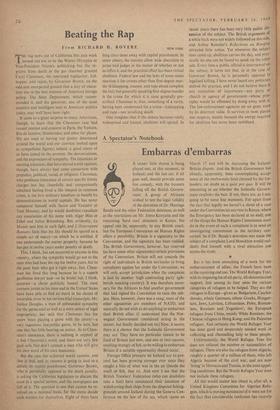Beating the Rap
From RICHARD H. ROVERE
NEW YORK
Tni big news out of California this past week turned out not to be the Winter Olympics or Vice-President Nixon's politicking but the re- prieve from death in the gas chamber granted Caryl Chessman, the convicted highjacker, kid- napper, and rapist, by Governor Brown, on the odd and unexpected ground that a stay of execu- tion was in the best interests of American foreign policy. The State Department, which recom- mended it, and the governor, one of the most sensitive and intelligent men in American politics today, may well have been right.
It came as a great surprise to many Americans, though, to learn that the Chessman case had roused interest and concern in Paris, the Vatican, Rio de Janeiro, Montevideo, and other far places. We are used to having our justice denounced around the world and our convicts looked upon as sympathetic figures; indeed, a good many of us have joined in the protests, the denunciations, and the expressions of sympathy. The injustices, or seeming injustices, that have stirred world opinion, though, have always had some connection with prejudice, political, racial, or religious. Chessman, who professes innocence of certain specific felony charges but has cheerfully and unrepentantly admitted having lived a life steeped in common crime, is the first ordinary hoodlum to benefit by demonstrations in world capitals. He has never compared himself with Sacco and Vanzetti or Tom Mooney, and he would doubtless repudiate any association of his name with Alger Hiss or Ethel and Julius Rosenberg. But, evidently, Le Monde sees him in such light, and L'Osservatore Romano feels that his life should be spared as a simple act of mercy—to which he is entitled, if one understands the matter properly, because he has put in twelve years under penalty of death.
This, I think, has not occurred to anyone in this country, where the sympathy would go not to the man who had beat the rap for twelve years, but to the poor bum who got it right away, fast. Chess- man has lived this long because he is a superb gaolhouse lawyer and—to be brutal but, l think, accurate—a clever publicity hound. The most eminent jurists in his state and in the United States have been able to find no merit in his claims of reversible error in his various trial transcripts. Mr. Justice Douglas, a man of unbounded sympathy for the persecuted as well as a stern seeker of legal impropriety, has said that Chessman has for years 'been playing a game with the courts'—a very ingenious, lawyerlike game, to be sure, but one that has little bearing on justice. As to Chess- man's innocence, there is nothing in support of it but Chessman's word, and there are very few gaol cells that don't contain a man who will give his own word of his own innocence..
But the case has achieved world renown, and that is that, and its renown is going to lead to a debate on capital punishment. Governor Brown, who is personally opposed to the death penalty, is asking the California legislature to discuss the issue in a special session, and the newspapers are full of it. The question is one that cannot be re- solved on a national basis, for the states decide such matters for themselves. Eight of them have long since done away with capital punishment. In some others, the statutes allow wide discretion to juries and judges in the matter of whether or not to inflict it, and the practical effect has been virtual abolition. Federal law and the laws of some states sanction it for crimes other than first-degree mur- der (kidnapping, treason, and rape about complete the list), but generally speaking first-degree murder is the crime for which it is most generally pre- scribed. Chessman is, thus, something of a rarity, having been condemned for a crime—kidnapping and rape—not involving death.
One imagines that if the debate becomes really widespread and heated, abolition will spread. In
recent years there has been very little public dis- cussion of the subject. The British arguments of a while back were not widely followed on this side, and Arthur Koestler's Reflections on Hanging attracted little notice. Yet whenever the subject does come up, abolition carries the day, and prac- tically no one can be found to speak on the other side. Every time a public official is interviewed en the subject, it turns out that, is in the case of Governor Brown, he is personally opposed to legalised killing. I have never heard any politician defend the practice, and I do not believe there is any institution of importance—any party or church or agency of government—whose prin- ciples would be offended by doing away with it. The law-enforcement 'agencies set no great store by its deterrent value. It survives in most places. one suspects, mainly because the energy required for abolition has never been mobilised.


































 Previous page
Previous page